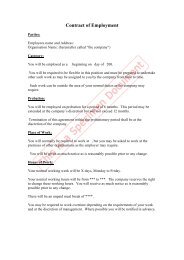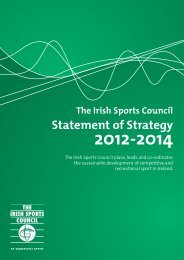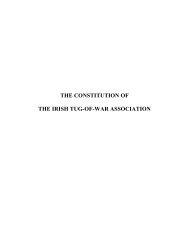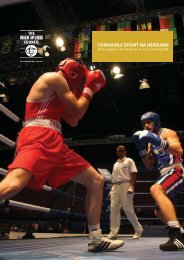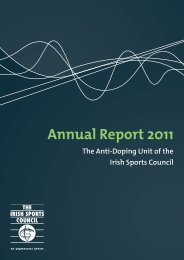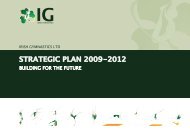Strategic Planning Guidelines - The Irish Sports Council
Strategic Planning Guidelines - The Irish Sports Council
Strategic Planning Guidelines - The Irish Sports Council
You also want an ePaper? Increase the reach of your titles
YUMPU automatically turns print PDFs into web optimized ePapers that Google loves.
As likely as not, rumours will start as soon as the analysis report is produced and some<br />
people will convince themselves, often with no evidence that it has been or will be kept<br />
from them. Such rumours and misinformation can seriously harm the strategic planning<br />
process because they usually take a disproportionate amount of effort to overcome and<br />
divert attention from more important matters. If someone asks for a copy, make sure they<br />
get it – another reason for keeping the Analysis Report as short as possible. It will also be<br />
sensible to circulate the analysis report to partners and clubs (as appropriate e.g. post on<br />
website) to make the point that the whole of the planning process is open and transparent.<br />
Step 3: <strong>Planning</strong> Workshop<br />
NGBs may find gathering a mass of analytical information comparatively easy but<br />
deciding what to do with it is much more difficult. One response is to undertake more<br />
analysis, but this can be counter-productive because the problem of deciding what is<br />
really important becomes even more difficult. However, Step 3 is the critical one in<br />
terms of shaping the eventual plan because it is the stage in which the “big” decisions are<br />
taken. <strong>The</strong>se big decisions relate primarily to three things:<br />
• <strong>The</strong> NGB’s vision of the future<br />
• <strong>The</strong> NGB’s mission<br />
• <strong>The</strong> NGB’s key goals<br />
Those involved in this stage of the process must take care not to get bogged down in<br />
detail; instead they must concentrate on setting the overall direction and priorities of the<br />
NGB for the next few years. This means that they must ignore individual interests or<br />
loyalties and seek instead to “invent” the role of the NGB. Furthermore, the process must<br />
neither be rushed nor led by any particular interest group within the NGB.<br />
Possible approaches are:<br />
• <strong>The</strong> planning team can undertake the task.<br />
• One or two day intensive, interactive workshop with key people who will be involved<br />
in implementing the eventual plan, although not all of them should be Directors.<br />
While the other approach may be appropriate in some instances, in most cases a planning<br />
workshop offers the best prospect of success. Key characteristics of successful<br />
workshops are:<br />
• <strong>The</strong>y should last a minimum of a day and ideally a weekend from say lunchtime on<br />
the Saturday to after lunch on the Sunday.<br />
• <strong>The</strong>y should involve 12-20 people, carefully selected to include a blend of those<br />
already involved and people not directly involved at present, but with their own views<br />
on how the NGB should develop in future. Again, it may be worth including some<br />
22



